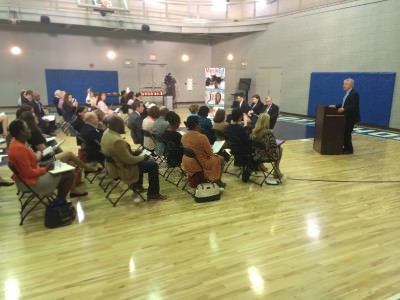Since Ann Clark officially became Charlotte-Mecklenburg Schools superintendent earlier this year, she’s rarely made a public appearance without uttering five words:
“Literacy is our North Star.”
Clark, to use the well-worn cliché, put her money where her mouth is—by requesting an additional $6 million dollars from Mecklenburg County to fund new literacy initiatives designed to “do right by the students,” she said.
The request is part of CMS’ proposed $1.37 billion operating budget, $428.1 million of which would come from Mecklenburg County. If Mecklenburg County commissioners approve the request as written, it would be an increase of roughly 10 percent, or $39.9 million, from last year’s budget.
And although the literacy programs amount to a small percentage of the new funding and the operating budget as a whole, they reflect Clark’s deep belief that CMS can do more to make sure students are reading at or above grade level by third grade.
“We also hear the clock of urgency ticking,”
Clark said when CMS released its School Performance Grades in February. Forty-four percent of the district’s elementary schools earned Ds or Fs in reading. CMS’ third grade reading proficiency rate is at 40 percent.
The CMS proposal would spend money to expand reading camps that help struggling elementary students become more proficient readers. It maintains funding for teacher assistants, which Clark argues are essential to giving young children the attention necessary to build literacy skills. The budget would also fund more professional development tied to literacy.
Clark’s request comes as Charlotte’s corporate and philanthropic communities focus attention on literacy. The new Read Charlotte initiative will use more than $5 million in private funds to work toward a goal of doubling the percentage of third graders reading at grade level by 2025.
The literacy initiatives are noteworthy, in part, because they are among the very few new items embedded in CMS’ operating budget. Clark is asking for about $10 million to raise most employee salaries by 2 percent, and the budget calls for $2.5 million to pay for driver’s education programs which are likely on the chopping block at the state level this year.

But the rest of the budget focuses on maintaining existing programs and funding enrollment growth in CMS and local charter schools.
CMS anticipates about another 2,400 students next school year, requiring $2.4 million, plus an additional $3.2 million in costs related to additional space for new and existing students. The budget request also calls for $8 million in county dollars that would be passed-through to local charter schools as required by law.
There are no flashy programs billed as “transformative” or “innovative.” There is no massive spending request to the tune of tens of millions of dollars for one initiative. Clark isn’t known for being flashy or loud, but is respected for being straightforward and focused.
In many ways, the budget she presented to the school board reflects that style, pointing its compass toward her North Star.
“I make no apologies for the recommendations that I put before you,” she said.



